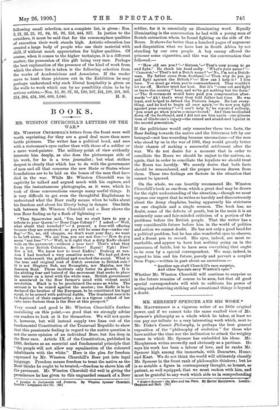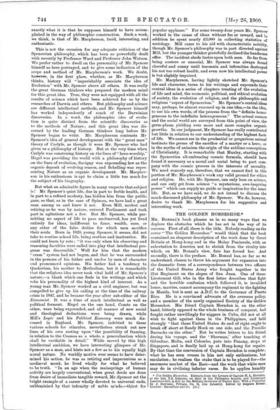MR. HERBERT SPENCER AND HIS WORK.*
MR. MACPHERSON is a vigorous writer of no little original power, and if we cannot take the same exalted. view of Mr. Spencer's philosophy as a whole which he takes, at least We can pay our tribute to a very interesting work which, next to Mr. Flake's Cosmic Philosophy, is perhaps the best general exposition of the "philosophy of evolution" for those who have neither the time nor the inclination to attack the weighty tomes in which Mr. Spencer has embedded his ideas. Mr. Macpherson writes avowedly and obviously as a partisan. He says his work has been a labour of love, and he ranks Mr. Spencer high among the immortals, with Descartes, Hume; and Kant. We do not think the world will ultithately classify Mr. Spencer in the front rank of philosophic thinkers ; but he is so notable a figure in contemporary thought, so honest, so patient, so well equipped, that we must reckon with him, and must be grateful to any work which aids us in oomprehendins * Herbert Spencer: fh Man and his *ark. Dy Efattar MA4Aing;ii• US& Chapman and Hall. LSO
exactly what it is that he supposes himself to have accom- plished in the way of philosophic construction. Such a work, we think, is that of Mr. Macpherson, lucid, interesting, and enthusiastic.
This is not the occasion for any adequate criticism of the Spencerian philosophy, which has been so powerfully dealt with recently by Professor Ward and Professor John Watson. We prefer rather to dwell on the personality of Mr. Spencer himself as here portrayed, and to give some indication of the scope and method of Mr. Macpherson's work. We doubt, however, in the first place, whether, as Mr. Macpherson thinks, history will "imperishably associate the idea of Evolution" with Mr. Spencer above all others. It was really the great German thinkers who prepared the modern mind for this great idea. True, they were not equipped with all the results of science which have been achieved for us by the researches of Darwin and others. But philosophy and science are different intellectual methods, and Mr. Spencer himself has worked independently of much of the Darwinian discoveries. In a word, the philosophic idea of evolu- tion is quite distinct from• the scientific discoveries as to the methods of Nature ; and this great idea was dis- cerned by the leading German thinkers long before Mr. Spencer began to write. Mr. Macpherson contrasts Mr Spencer's idea of general development with the "great man" theory of Carlyle, as though it were Mr. Spencer who had given us a philosophy of history. But at the very time when Carlyle was construing history on the lines of " hero-worship," Hegel was providing the world with a philosophy of history on the lines of evolution, Savigny was expounding law as the organic deposit of evolving reason, and Schelling was repre- senting Nature as an organic development. Mr. Macpher- son in his enthusiasm is apt to claim a little too much for the subject of his biography.
But what an admirable figure in many respects that subject is Mr. Spencer's quiet life, due in part to feeble health, and in part to a refined modesty, has hidden him from the public gaze, so that, as in the case of Spinoza, we have had a great man among us and knew it not. Even Mill, modest and retiring as he was by nature, entered Parliament and took part in agitations not a few. But Mr. Spencer, while per- mitting no aspect of life to pass unobserved, has yet lived entirely for ideas, indifferent to fame, wealth, ease, or any other of the false deities for which men sacrifice their souls. Born in 1820, young Spencer, it seems, did not take to routine school life, being restless and inattentive. He could not learn by rote ; "it was only when his observing and reasoning faculties were called into play that intellectual pro- gress was discernible." Well for him that the modern " cram " system had not begun, and that he was surrounded in the persons of his father and uncles by men of character and pronounced opinions. His father had a tendency to Quakerism, his mother to Methodism, but it is remarkable that the religious idea never took vital hold of Mr. Spencer's nature,—a blank which one feels in his writings and which robs his personality of the highest kind of interest. As a young man Mr. Spencer worked as a civil engineer, but was compelled to give up his calling at the time of the railway crisis in 1847, and he became the year after sub-editor of the Economist. It was a time of much intellectual as well as political ferment. Hegel on the one hand, Comte on the other, were being expounded, and all manner of new social and theological deductions were being drawn, while Mill's Logic and his Political Economy were much dis- cussed in England. Mr. Spencer, indebted to these various schools for stimulus, nevertheless struck out new lines of his own resting upon "the possibility of framing, in relation to the Cosmos as a whole, a generalisation which shall be verifiable in detail." While moved by this high intellectual ambition, we have interesting glimpses of Mr. Spencer as a man, and hints not a few as to his equally high moral nature. No worldly motive ever seems to have deter- mined his action, he was as retiring and impecunious as a medieval monk, he lived wholly for what he believed to be truth. "In an age when the mainsprings of human activity are largely conventional, when great deeds are done from desire of immediate tangible reward, Mr. Spencer set the bright example of a career wholly devoted to universal ends, unblemished by that infirmity of noble m:nds,—thirst for
Popular applause." For some twenty-four years Mr. Spencer worked in the cause of ideas without fee or reward, and in addition he spent nearly E3,000 in collecting statistics of sociology Mill came to his aid with characteristic nobility, though Mr. Spencer's philosophy was in part directed against Mill, but the younger thinker gratefully declined the handsome offer. The incident sheds lustre upon both men. So far from being austere or unsocial, Mr. Spencer was always found cheerful and sunny until insomnia and infirmities destroyed his not too robust health, and even now his intellectual power is but slightly impaired.
Mr. Macpherson, having lightly sketched Mr. Spencer's life and character, turns to his writings and expounds their central ideas in a series of chapters treating of the evolution of life and mind, the economic, political, and ethical evolution of society, the evolution of religion, and the philosophic and religious "aspect of Spencerism." Mr. Spencer's central ideas may, perhaps, be almost summed up in one idea,—in the idea, to use his own words; of the process from the "definite homo- geneous to the indefinite heterogeneous." The actual cosmos and the social world are surveyed from this point of view, the germ-plasm yielding ever more and more complex organic growths. In our judgment, Mr. Spencer has really contributed but little in relation to our understanding of the highest facts of life. We cannot see in the prudential or gregarious animal instincts the germs of the sacrifice of a martyr or a hero ; or in the myths of animism the origin of the sublime conceptions of Christianity. It is remarkable that Huxley, starting with the Spencerian all-embracing cosmic formula, should have found it necessary as a moral and social being to part com- pany with the cosmic process in the interests of morality. We need scarcely say, therefore, that we cannot find in this portion of Mr. Macpherson's work any valid ground for ethics and religion. He, with Mr. Spencer, can only lean on science, and can only get from science "a mysterious, awe-inspiring power" which can supply no guide or inspiration for the inner life. But, as we have said, we do not intend to discuss the much-discussed philosophy of Mr. Spencer. We do, however, desire to thank Mr. Macpherscn for his suggestive and interesting work.







































 Previous page
Previous page